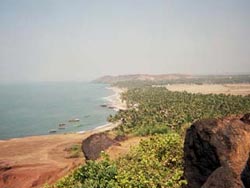| Anjuna Beach |
 With
its fluorescent painted palm trees and infamous full moon
parties, ANJUNA, 8-km west of Mapusa , is Goa at its most
"alternative". Designer leather and lycra may have
superseded cotton Kaftans, but most people's reasons for coming
are the same as they were in the 1970s: dancing and lying
on the beach slurping tropical fruit. While browsing in the
area have a day trip to the famous flea market.
The Beach
One of the main sources of Anjuna's enduring popularity as
a hippy hang out is its superb beach. Fringed by groves of
swaying coconut palms, the curve of soft white sand conforms
more closely to the archetypal vision of paradise than any
other beach on the north coast. Bathing is generally safer
than at most of the nearby resorts, too, especially at the
more peaceful southern end, where a rocky headland keeps the
sea calm and the undertow to a minimum.
North of the market ground, the beach broadens, running in
an uninterrupted kilometre long stretch of steeply shelving
sand to a low red cliff. The village bus park lies on top
of this high ground, near a crop of small cafes, bars and
Kashmiri handicraft stalls. Every lunch hour, tour parties
from Panjim pull in here for a beer, before heading home again,
leaving the ragged army of sun weary westerners to enjoy the
sunset. |
| Getting There |
| Buses from Mapusa and Panjim drop passengers
at various points along the Tarmac Road across the top of the
village, which turns right towards Chapora at the Main Starco's
crossroads. The Starco's crossroads has a couple of small stores,
a motorcycle taxi rank, and functions as a de facto village
square and bus stand. |
| Accomodation |
Most of Anjuna's very limited accommodation
consists of small-unfurnished houses. Some of the resorts
and guesthouse can be found at the main Starco's crossroads
area. But the best choice for accommodation is available in
Calangute , Baga or nearby Vagator or Chapora . |




